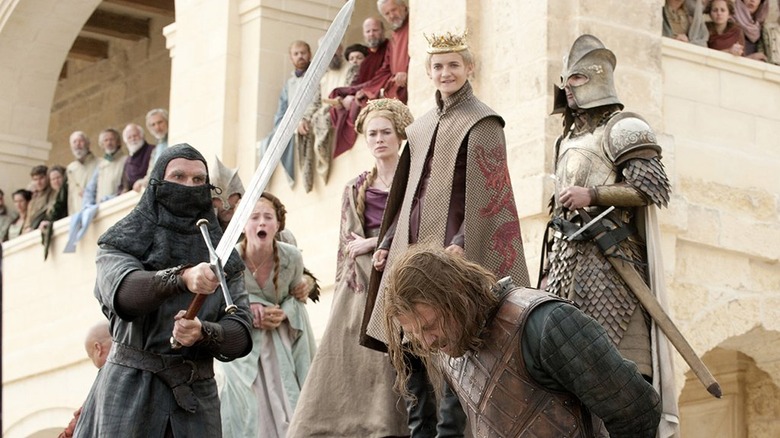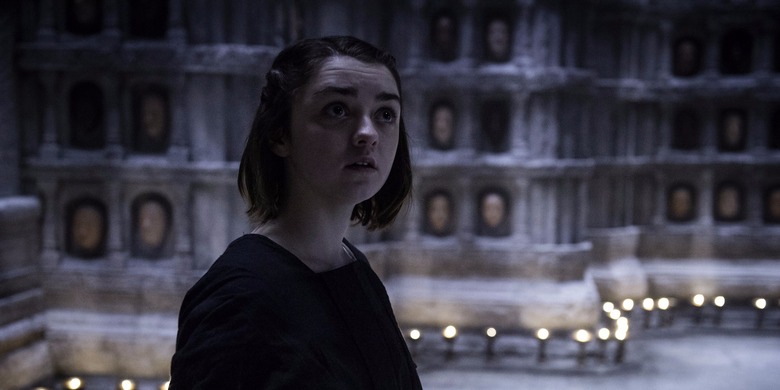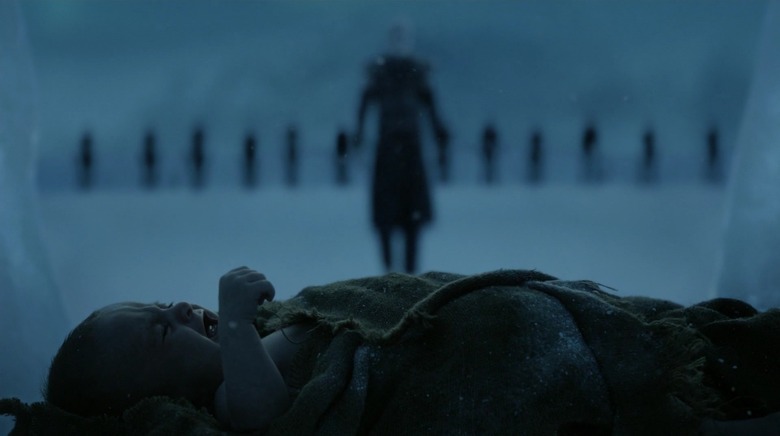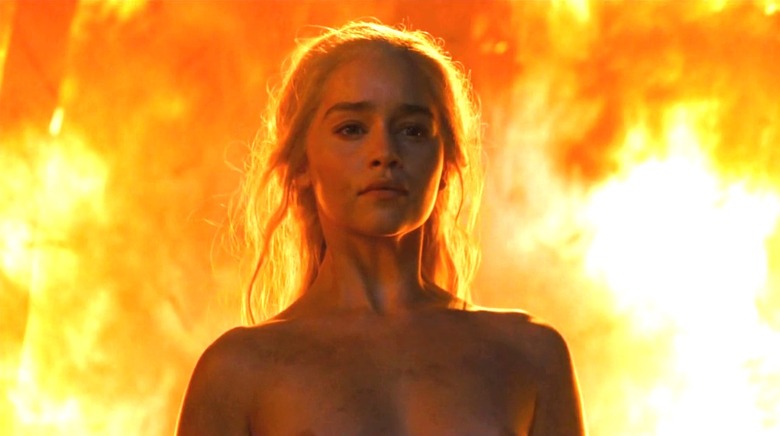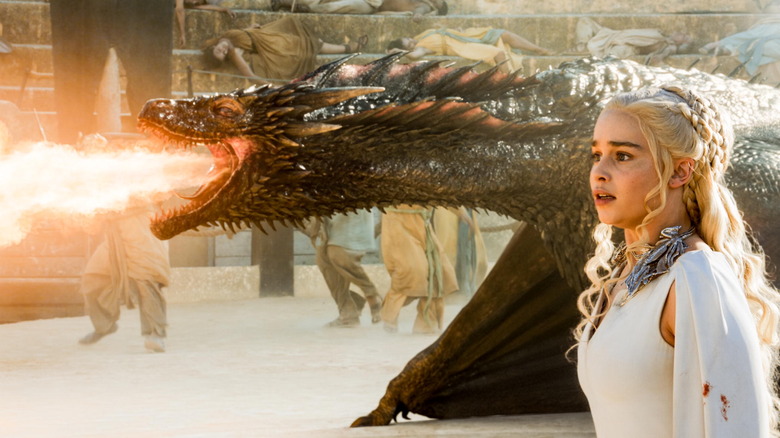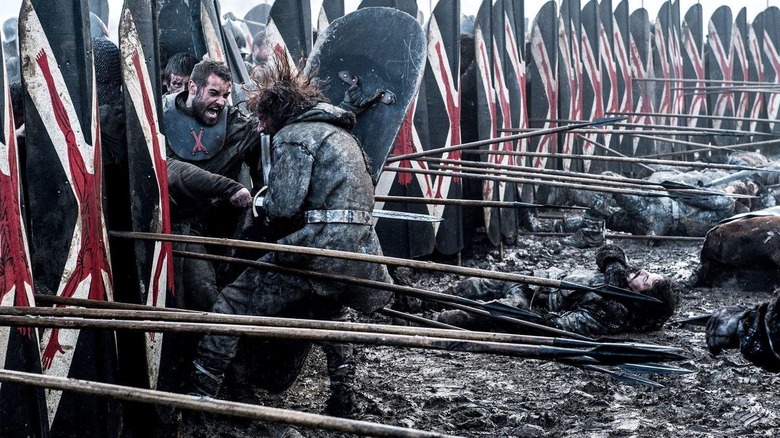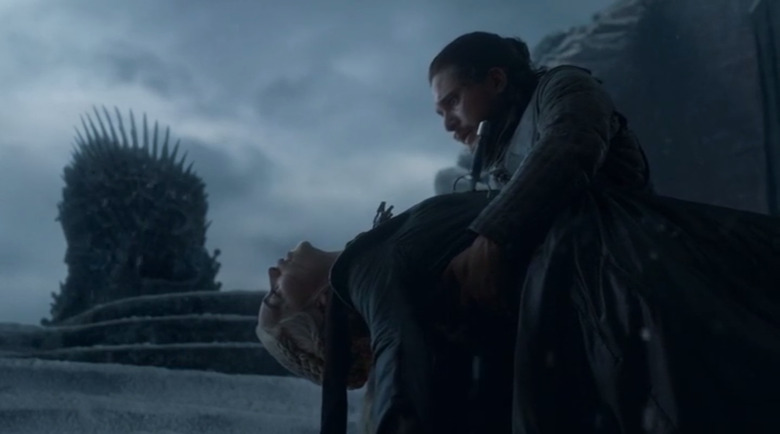The Best And Worst Aspects Of 'Game Of Thrones' Serve As A Time Capsule Of The 2010s
Game of Thrones is a show that is profoundly of its time. It's a sword made of the finest Valyrian steel that has cut through pop culture but is nonetheless two-edged in its relation to and reflection of the cultural zeitgeist. The story begun in George R.R. Martin's A Song of Ice and Fire novels drew from cycles of history and fictional tropes to present what's been called "Realpolitik in a fantasy world." It was the Wars of the Roses meets The Lord of the Rings; but whereas author J.R.R. Tolkien was a World War I veteran writing concurrently with World War II, Martin is a writer who was a conscientious objector in Vietnam and whose books spawned a television series that would air in the aftermath of the Iraq War.Game of Thrones premiered on HBO a year into the 2010s ... and now its watch is ended in the last year of the decade, before the 2020s begin. Amid the real-world problems of 2019, there's a tendency sometimes to dismiss entertainment talk as trivial, but entertainment also has a way of preserving history — or the agreed-upon lie of it — beyond the day's headlines. It's as much a time capsule as it is a means of escape.
When people look back at Game of Thrones, they will see an elaborate map of mythology where the grinding gears of cities rose up with plot twists to complicate (and often end) the lives of memorable characters. It's quite possible that they will also see an ugly mosaic of all that was/is wrong with the world. If, as Vulture recently posited, this prestige drama represents "the last show we'll watch together," then before the watercooler drains, it will have left us with an artifact that speaks volumes about the era in which we're living.
Thrills and Chills in the Age of Uncertainty
At its best, Game of Thrones leveraged intrigue and world-building into an engrossing geopolitical saga with real-world overtones (this, despite the obvious fantastical shadings like fire-breathing dragons). It showed us a morally grey landscape where even the noblest characters could be doomed by their own tragic choices.
In the beginning, before we met the Night King in Season 4, there was no Sauron-like foe for the heroes to rally against. The White Walkers were there from the very first scene, but whether it was for organic plot reasons and/or a lack of budget for CGI, the supernatural menace of those ice zombies was more a background threat, among other Byzantine human threats.
In this way, Game of Thrones was the perfect show for a paranoid, post-9/11 world where the Nazis of wars past have given way to less clear-cut enemies who lurk in the shadows and strike when we least expect it. "The night is dark and full of terror[ist]s." We live in a time of increasing uncertainty; the show tapped into that with its wild unpredictability, the way it destabilized the viewer by killing off its ostensible main character and giving us events like the Red Wedding.
If you think about how much mainstream appreciation the horror genre has been enjoying in recent years, it's not hard to see the horror elements of Game of Thrones and stories like it as a release valve for troubled times. The show premiered about six months after The Walking Dead (the two shows would sometimes overlap in the same Sunday night time slot); and while I would argue that "Hardhome" was a scarier zombie apocalypse than anything we ever saw on AMC, there's probably a correlation to be drawn between the emotional hardening Rick Grimes underwent and the one Game of Thrones viewers underwent as they witnessed their own naive Rick analog get played for a fool and beheaded.
Seeing Sean Bean's character, the show's poster boy, on an old Entertainment Weekly list of the most shocking TV deaths is what first made me interested in watching Game of Thrones. Only later, in-between seasons, would I start reading Martin's novels, decorating my bookshelf with those thick tomes and listening to Roy Dotrice narrate a couple of the audiobook versions.
Ned Stark's demise remains spoiler-proof because it's thematically rich. You think he's the protagonist. He's like Marion Crane in Psycho, only instead of the spooky Bates Motel, he ventures down the King's Road into the shark-infested waters of King's Landing.
With Ned, there's a real lack of foresight at play. Out of honor or a misguided sense of it, he lies to his loved ones about Jon Snow's parentage ... and doesn't withhold information from his enemies about Joffrey's parentage. Being forthcoming with all the wrong people makes him an easy mark for Cersei Lannister and Littlefinger, two expert, city-dwelling players of the game of thrones. It's a fatal blunder when he tips his hand to Cersei, giving her the heads-up that he's learned the truth about Joffrey.
Though it leaves the viewer reeling at first, when you do the math later, it makes perfect sense that a simple, idealistic man like Ned would get outmaneuvered by these Machiavellian forces. His false confession and decapitation on the steps of the Great Sept of Baelor, the center of religious worship in King's Landing, takes us beyond good and evil. That's the post-modern territory where Games of Thrones lives along with its viewers.
In later seasons, this same location, the Great Sept, will serve as the site of important weddings and funerals—some of which are travesties, like the one that sees Ned's own daughter marry into the very family that is responsible for his death. It's here, also, that the Sparrows, Martin's version of the medieval Catholic Church, will revive the power of the Faith Militant (a group whose name quickly conceptualizes yet another social force that has shaped the current millennium). With the modern Catholic Church embroiled in sex abuse scandals, Ned's demise, the spilling of his blood on those steps, would seem to christen the Sept of Baelor as a foundation of lies: one more failing structure in a world full of them.
Welcome to the 2010s. Ned Stark's death showed the at-home audience how honor alone was not virtue enough to survive. Playing the game of thrones meant using intelligence and pragmatism to navigate an amoral, sometimes cheerfully immoral, human chessboard.
In the absence of Ned — and his son Robb, who seemed poised to become the next noble northern leader until the Red Wedding — what was left on Game of Thrones were "cripples, bastards, and broken things." Tyrion Lannister, himself a dwarf, spoke fondly of them. The one-handed Kingslayer, the disgraced northern lord affected with greyscale ... lost souls like these were the heart of Game of Thrones.
Women in the Hall of Faces
Game of Thrones built its brand as a drama where you never knew what might happened next. It wielded capriciousness as a storytelling strength, however the show was not without its problematic aspects. These went over and above the occasionally dodgy writing in later seasons.
From its first season onward, the show grew increasingly cruel in its depiction of sex, violence, and sexual violence. Reams have been written about this; it's a hot-button topic that takes up much space in the online part of the time capsule. Remember Ros, the red-haired prostitute who lived and moaned through the infamous "sexposition" scene in Littlefinger's brothel (S1E7, "You Win or You Die"), only to wind up becoming a bedroom crossbow target for King Joffrey (S3E6, "The Climb?")
Ros was the face of a legion of show victims, whose skinned visages wouldn't look out of place if they were mounted on pillars in the Hall of Faces in Braavos. Not all of these victims were women — as Theon Greyjoy's protracted torture and castration in Season 3 goes to show — but as the onscreen rapes compounded, gender dynamics did become an inseparable part of the discussion surrounding Game of Thrones.
Even with Arya taking out the Night King and Sansa left to rule the North in the end, the wobbly character arc of Daenerys Targaryen (more on that later) has effectively looped us back to the point where that's once again become the defining sociopolitical argument in many critical appraisals of the show. To be clear, gender dynamics weren't an issue for every viewer on the street; I've certainly talked to female fans who were less concerned with that than they were basic storytelling issues. Unless you're wildly insensitive, however, you'd have to recognize that it could be triggering for some viewers to see rape or even feel it threatened.
In a story about power and the pursuit of it, it makes sense from a theoretical standpoint that a pervasive crime of power like sexual assault might factor in as a plot device. There are ways to go about approaching that kind of subject matter: Netflix's Jessica Jones is one example that comes to mind of a show that did it right, inasmuch as it refused to portray it visually or treat it as positively transformative for its acerbic title character, a mighty Marvel superhero who also happened to be a rape survivor.
Game of Thrones, by contrast, never shied away from showing or describing the act, with three major female characters — Daenerys, Cersei, and Sansa — enduring it, to name but a few. The absolute nadir was Sansa's wedding-night violation and the focus on Theon's reaction to it in the Season 5 episode, "Unbowed, Unbent, Unbroken," which was, it's worth noting, the single worst-reviewed episode of the series ... until its penultimate episode last week, "The Bells."
Martin's books are actually much worse in terms of rape. There are about four times as many instances of it on the page as there on the screen, but there's something about witnessing it acted out physically (with a girl we've watched grow up like our fictional sister, no less) that renders it vivider in the imagination.
Again, women weren't the only meat-grinder victims in the Hall of Faces on Game of Thrones, but they inhabited their own special wing in that world of hurt. Being married off to a sadist or objectified as a crossbow target is something quite different from being a willing participant in a duel to the death. When we first met Oberyn Martell, he waltzed right into a sexy foursome; when last we saw him, the Mountain was gouging his eyes out and crushing his skull. Yet he had full agency before he met his ignominious end.
Looking back, what made the sexual violence (as opposed to just plain violence of the eye-gouging variety) all the more troubling was how the show had such a leering quality to it, even when it was in its default, non-rape mode. With a male author, male showrunners, and a writer's room that eventually shifted to all-male, as well, Game of Thrones is a series that proved itself incapable of truly separating from the male gaze.
Behind the scenes, producers seeking to "represent the pervy side of the audience" vied for the inclusion of more full frontal nudity. (This choice of verbs, "represent," seems particularly droll given how the show only made room in its sprawling Eurocentric cast for two significant black characters, one of whom, Missandei, sadly got fridged). Throughout the series, there were countless bits of physical and verbal posturing wherein characters seemed to act as hedonistic mouthpieces, espousing the worldview that women and wine, flesh and ale, were the only pleasures to be had in an otherwise meaningless hellscape.
Tyrion and Bronn's crass dialogue was part of their charm, but even they weren't exempt from the ubiquitous corruption in Westeros, a place where fan-favorite characters were not above strangling their former lovers (or committing patricide) and where their best friends were primarily motivated by money.
What we see here, you understand, is very much a hyper-reality where all the ills of the world are magnified and dramatized and fed back into the world until it chokes on the entertainment. Again and again, like flesh-rending lashes from a cat o' nine tails, we were shown how violent and unforgiving this hyper-reality could be. But was the ethos of it really so different from that of our own mundane world?
The Secret of Craster's Keep
Salman Rushdie famously called Game of Thrones "addictive garbage" and "well-produced trash." If it is those things, maybe part of the reason is because it reflects 21st-century society's own dubious values back at it in an uncomfortable manner. We like to think we're more civilized than the medieval brutes who populate Westeros, but civilization has a way of putting a polite veneer on things, covering them up so that they're not out in the open where they can remind us how little we've really advanced on certain fronts.
Cut to the real world, circa late 2017. Not long after Game of Thrones had completed its pseudo-feminist, Season 6-7 victory lap, the Weinstein effect began to expose a viper's nest of high-profile abusers in Hollywood and across numerous industries. While we've yet to hear a #MeToo story involving a bath-robed studio bigwig with a crossbow, it's not hard to equate men in real-life positions of power with characters like Joffrey, Ramsey Bolton, or Walder Frey.
One phrase we've heard a lot as stories of abuse have come to light in the media the past few years is "an open secret." The idea of a known wrong that people overlook while they have dealings with the perpetrator brings to mind Craster, the wildling who maintained his own fiefdom of daughter-wives at Craster's Keep, where he sacrificed his incestuous baby sons to White Walkers.
Craster was an ally of the Night's Watch, whose Lord Commander, Jeor Mormont (Jorah's dad), chose to look the other way when confronted with what was happening at Craster's Keep. His reasons were practical—because the Night's Watch needed Craster for shelter and intel north of the Wall.
In the end, however, by turning a blind eye, Lord Commander Mormont, the guy in charge, not only helped uphold a small system of evil; he strengthened the big one, allowing Craster to supply the White Walkers with more human fodder for their army, which would, in turn, attack the Wall and overcome it, breaking through to Winterfell and threatening all the living of Westeros.
That's the real metaphorical issue with Game of Thrones. It's a question worth considering: was this show furthering a useless narrative? Was it part of the problem? Did it harm more than it helped? Or are its failings our failings?
In the 2010s, this goes to a broader question about the role of fandom and how it's grown more deeply entwined in the entertainment it consumes. Art imitates life, but life also imitates art and the stories we tell ourselves become our truths. They're like self-fulfilling prophecies in that way.
In lifting up miserable flaws on the part of itself and its characters — in showing us the limits of human potential with regressive arcs — did Game of Thrones only serve to defeat itself and reinforce stereotypes about the place of women and men in the world? For some viewers, it's understandable that the final outcome of Dany's storyline might be the last insult, the point where the show's sadistic, misogynistic streak tipped too far into propagating brutality and sexism, rather than just offering up an artistic reflection of it as it already exists in human history.
From the perspective of tragedy as a teaching tool, the downfall of Daenerys was Ned Stark all over again: an abject lesson illustrating the danger of getting attached to an aspirational hero in a world where there was no such thing. If Ned was the short con that spanned a single season, Daenerys was the long con that spanned the whole series. But whereas his fate was a deal-maker — the well-earned surprise that brought viewers like me on board — the handling of her fate looks to have been a last-minute deal-breaker to a large swath of the show's audience.
Daenerys Targaryen, Old Testament Goddess of Justice
Even in Seasons 6 and 7, when Game of Thrones began to empower its major female characters more — giving Cersei and Sansa their revenge and continuing the rise of Daenerys — its pivot toward them seemed halfway touched with guilt, as if it was suddenly self-aware, conscious of the optics, ready to respond with feigned progressivism. That kind of disingenuous facade is also something that has run rampant in the culture at large in the aftermath of Weinstein, as the gatekeepers of a deeply entrenched patriarchal system have helped foster the illusion of change, all the while maintaining a certain underlying status quo.
Topple the careers of as many famous men as you want, the world seems to say, but we're still going to let fireable harassment offenses and other toxic masculine behavior permeate the highest levels of government. In this climate, with blood and boobs decorating the screen, it's as if the boy's club running the show became the welcoming "woke" dad in Jordan Peele's Get Out, reassuring us that it was ahead of the paradigm shift and would do right by the women of Westeros. It's not inconceivable that some bad press might have filtered back to the clubhouse and precipitated this reformed quasi-abuser routine, but if so, it didn't stick, because before long, the show would seemingly sweep the rug out from under us again. Its parting message? Whelp, that Targaryens are tyrants and bitches be crazy.
Despite it all, I have to say, personally, the knife twist of "The Bells" worked for me in the moment. It tracked with my perception of Daenerys, insofar as I viewed her as an Old Testament figure, more a vengeful goddess of justice than a lamblike goddess of love. As a viewer with an imaginative predisposition, I would sometimes put myself in a hypothetical scenario with Daenerys where I envisioned what it would be like if I were standing below the steps in her audience chamber, faced with the choice of bending the knee to her in the Great Pyramid of Meereen. I didn't always agree with her (did you?), but I respected the sovereignty imbued in her by her dragons and royal lineage, which seemed to give her a viable claim to the Iron Throne.
I knew that her wrath, when provoked, could be terrible, but she also had a benevolent side. Hoping for the best, bracing for the worst, I could only project myself onto Tyrion, who was allowed to speak his mind and advise Daenerys with the provision that the final decision in all things rested with her, the (retroactively Mad) Queen.
R+L=J notwithstanding, it didn't occur to me, initially, that the show was putting Daenerys on a regicidal collision course with Jon, but in hindsight, that made sense, at least going forward from the moment when she had her dragon mercilessly toast his best friend's father and brother. Samwell Tarley was one of the few characters on the show who seemed like an all-around decent person, so seeing him reduced to tears at her imperious delivery of the news this season definitely cast the Mother of Dragons in a different light.
Now that she's dead, what are we to make of this forceful heroine, whose story we followed for so long, only to see her break bad late in the game—thereby re-framing her as a firm anti-heroine, perhaps the greatest we've ever seen on television? Is there enough thoughtful political subtext in Dany's arc to offset the disappointment of seeing a pop culture icon tarnished with an unfavorable narrative outcome?
Mother of Dragons, Breaker of Chains
If you divorce Daenerys from gender and just talk about her as a leader, she fits the mold of a populist rather well. Google defines a populist as "a person, especially a politician, who strives to appeal to ordinary people who feel that their concerns are disregarded by established elite groups."
That's precisely how Daenerys Targaryen made her name. Freeing the slaves of Yunkai, she became the Great White Feminist Hope, hoisted up and hailed as "Mhysa," or Mother, to a crowd of dispossessed people. Later, she spearheaded the Liberation of Slaver's Bay, indiscriminately crucifying 163 slave masters in retribution for the crucifixion of 163 children. An eye for an eye.
That she seemed better at conquering than ruling was almost an afterthought. Lest we forget, the first phase of her disastrous reign in Meereen ended with the Sons of the Harpy staging a surprise attack that forced her to retreat out of a fighting pit on the scaly back of Drogon. She left the city in shambles and it fell to Tyrion and Varys to try and do damage control while she was off in the mountains, licking her wounds and linking up with the Dothraki. Even when she flew back in to reassert her authority, her stay in Meereen was short, because she had her sights set on Westeros all along.
If you think of her as a domineering populist but also a feminist beacon, it almost seems like Daenerys wound up being a conflation of Donald Trump and Hillary Clinton, as filtered through the unlikely prism of a medieval fantasy epic. Depending on how you look at it, that's either a juxtaposition of mismatched types or a pairing of ambition-oriented politicians, one of whom was clearly the lesser of two evils.
Martin conceived the character before the 2016 U.S. Presidential election was a glimmer in anyone's eye, of course; and the populism wave of the 2010s is something that transcends national borders. It's a global trend. It just so happens that this story drawing from cycles of history managed to align with one of those cycles as it was playing out again in the real world.
Dany's eleventh-hour heel turn is something that was foreshadowed and feels true to the show and its ideas about power lust (see also: Stannis Baratheon). After Westeros: world domination. It rings true to the M.O. of a conqueror. That said, the inability to reconcile Dany's contradictory qualities — signs of a dual nature that were scattered throughout the series all along — might explain some of the backlash toward her genocidal character evolution. "It's all in the execution," chimes the peanut gallery, and maybe it's right.
The changing rhythms of Game of Thrones gave way to an accelerated pace near the end, which would have been fine if the show had, from the very start, been skipping and jumping and teleporting all over the map instead of grounding us with road journeys. There are some legitimate late-stage complaints about the sudden wholesale idiocy that seeped in to afflict canny customers like Varys amid the show's widescreen plot machinations (apparently as a result of the rush to tie off Martin's ever-expanding, possibly never-ending, book narrative). Martin wrote himself into a corner; the showrunners inherited the Meerenese knot, his term for the overwhelming narrative logistics that have slowed his book output.
At least the showrunners managed to end their story, which is more than we can say for Martin at this point. I would have to go back and do a series re-watch to judge how truly imbalanced the foreshadowing was with Dany's character in action, as portrayed by Emilia Clarke. For now, I can only say that there's undeniably an aspect to Dany's rampage over King's Landing that also mirrors the burn-it-all mentality of a jilted fandom circa 2019...
The Warring Houses of the Seven Kingdoms
More than any other "appointment TV" phenomenon, Game of Thrones is one that has thrived in conjunction with social media and the democratization of film and television criticism across the Internet. With its diffusion of perspectives, the show has become this great relativistic document, something like the Mueller Report, where different sides project onto the same text and come away with opposing interpretations.
What's your favorite noble house, Stark or Lannister, or one of the many others? I'd be just as content to join the Brotherhood Without Banners, but not everyone rolls that way. People want to fly their flags. The showrunners were perhaps so focused on what Daenerys was supposed to be, via Martin's book blueprint, that they ignored what she became onscreen and in the eyes of fans offscreen.
This is a character who took on a life of her own. We've seen this happen time and again in pop culture, where creators put something out there into the world and the audience, fandom, takes ownership of it—to the point where every viewer becomes a dimestore Robert McKee and starts to think he or she knows what's best for the story (even perhaps becoming intractable in the face of anything contrary).
Star Wars stopped belonging to George Lucas long before he ever sold the franchise to Disney. I'm sure Rian Johnson, for one, appreciates getting labeled with the nickname "Ruin," as if he never left the kindergarten playground. The question no one ever asked: "Can you please expound, with vitriol and spelling errors, on all the ways The Last Jedi failed your inner child?"
Now it's happening with Game of Thrones, which puts the Star Wars franchise in an even more awkward place, given that showrunners D.B. Weiss and David Benioff (and Rian Johnson) are slated to be its stewards with new trilogies in the coming years.
People identify so strongly with their favorite characters, they grow so attached to their pet theories, that when faced with the official fan-fiction version of "The End" — as written or adapted by substitute scribes like Weiss and Benioff — they're invariably disappointed. If there's any consolation to be found in all this, it's that fans need not petition for a remake of Game of Thrones, Season 8. They need only wait for Martin to summon up the elegant prose to finally finish his A Song of Ice and Fire book series (if he ever can).
Not for nothing, but with Game of Thrones regularly ranking as the most pirated show on Earth (until just last year when it was on break), you have to wonder how many of those 1 million+ petition signers were actual paying HBO subscribers. Like Daenerys herself, critics and commenters and one-eyed Internet pirates named EuronGreyjoy69 love to spout revolutionary ideas. They're good at challenging the established order, highlighting the fallibility of the reigning storytellers, but when it comes to actual governance, really ruling rather than waging war, they might be at a loss. Otherwise, more of them would be out there working as creators rather than simple complainers and quarterbacks of the Monday morning variety (and yes, I'm one of those, too).
It seems like the only way to mitigate mass disgruntlement in the future would be for storytellers to adopt a Choose Your Own Adventure model whereby the viewer could pick from multiple endings. That's not so far-fetched, actually. My 2019 on /Film kicked off with a spoiler review of Netflix's Black Mirror: Bandersnatch, an interactive movie that sought to employ this very model. Ultimately, that experiment didn't land as some game-changing new Avatar for the 2010s, but who knows, maybe we'll see more of its kind in the 2020s.
The End of the MacGuffin Chase
One of the many ripple effects of Game of Thrones in its home stretch was that it got people talking about Lost again—another great watercooler show whose ending proved divisive back at the outset of the decade. Coincidentally, the first time I ever heard of Game of Thrones or George R.R. Martin was when I read something Martin had said criticizing the ending of Lost. Somewhere in the offices of HBO, Damon Lindelof must be cackling about poetic justice now.
In its (much nicer, more well-meaning) finale, Lost shepherded us into a church, where it gently came down on the side of character over plot. One of the reasons there was such initial blowback over that, maybe, is because people who were invested in the mystery element of the show had a hard time accepting that the mystery was a MacGuffin. It helped drive the zany island plot and the showrunners arguably underestimated just how much of a plot-driven mystery show Lost was to some viewers (even though its character-centric style of flashbacks and flash forwards obviously put said characters front and center from the very beginning).
In Game of Thrones, what seems to have happened, after the show went off-books, is the inverse of the Lost situation. The characters and their individual arcs became slaves to the expediency of the plot.
This show's MacGuffin, of course, was always the Iron Throne, which Drogon has now melted. As A Cast of Kings co-host Joanna Robinson so expertly predicted, it was the One Ring of Power and Jon was Frodo and Daenerys was Gollum. Plot developments in the quest for it once sprang organically from the characters and their choices, but toward the end, we got the sense that the characters were falling unnaturally into decisions and plot hoops that had been preordained by the writers. In the end, maybe the MacGuffin chase is always destined to conclude with the feeling that the journey was more satisfying than the destination.
Whatever you think of Game of Thrones, there's no denying its immense cultural clout. Here at the close of the 2010s, the complex tapestry that the show spent eight years weaving is one that roundly encapsulates the spirit of the times.
Westeros and its inhabitants are the soul of a rotten age. We witnessed their weak follies and black-hearted triumphs. Some of them were sympathetic; most of them, per The Dark Knight, either died or lived long enough to see themselves become the villain. Like Ramsay, the evilest bastard of them all, the show revealed its true colors early on and consistently traumatized its audience thereafter.
Perhaps we were gluttons for punishment. Now we may be at the point where the audience has outgrown the show and is ready to feed it to the dogs. But what is dead may never die.

